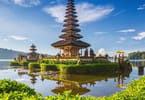(eTN) – Last week’s promulgation of the new constitution in Kenya saw several heads of state grace the occasion with their presence, including Ugandan President Yoweri Kaguta Museveni, and they all landed with full protocol at Nairobi’s main airport Jomo Kenyatta International. In stark contrast, however, the Khartoum’s regime leader, Bashir, snuck into Kenya through Wilson Airport from where he also left the country later on under a shroud of secrecy.
Air operators and passengers normally using Wilson Airport were reportedly irate over the closures of the airport for all traffic between arrival and departure of the tyrant, and three regular sources minced no words over this event – none of the comments, however, are fit to be repeated in the public domain, probably in itself a hint about how strong the sentiments were and what words were flying. Flights in and out of Wilson, East Africa’s busiest airport, were halted and then long delayed, scheduled flights to and from the national parks were disrupted, and charters had to be halted as passengers could either not get into Wilson Airport or because all commercial operations were grounded for the duration.
It appears that many of the leading politicians in Kenya did not know of his presence, and subsequently squabbles arose in Kenya’s political establishment over the wisdom of inviting an alleged war criminal and alleged genocidaire, wanted by the International Criminal Court in the Hague. Kenya is a signatory country to the ICC Convention and will be facing not just tough questions by the ICC but has already incurred the wrath of US President Obama and many other world leaders, who sharply condemned the invitation and presence of Bashir in Nairobi for the event. It is also understood that the ICC referred Kenya’s decision and behavior to the United Nations Security Council where the case is due to be discussed and a possible reaction and response will be prepared.
The ICC is also drafting indictments against perpetrators and promoters of the post 2007 election violence and instead of reveling in the newly-found world attention and spotlight, the day was by all accounts spoiled by Bashir’s presence. The alleged war criminal, brought to the venue by tourism minister Balala – a visitor Balala would also rather like to forget soon considering the negative publicity it brought to Kenya – had, according to a reliable source in Nairobi’s foreign ministry, secured guarantees beforehand that the arrest warrant would not be executed against him, and he only traveled to Nairobi after these assurances were given in writing. Subsequently, some government mouthpieces tried to defend the presence of Bashir in Kenya for the big day but were rubbished by the comments of many Kenyans posted on blogs and social websites, who openly questioned the sanity of the invitation.
The fallout has also reached the Southern Sudan, where regular high-ranking sources, on condition of strict anonymity, expressed their anger and disappointment with Kenya, having fully expected to see the First Vice President of the Republic of the Sudan, who is also the President of Southern Sudan, Gen. Salva Kiir, represent their country. In fact, some opinions proffered to this correspondent spoke of unspecified consequences for Kenya in their dealings with Southern Sudan. It appears that Gen. Kiir was all set to fly to Nairobi but was apparently told at the last moment that his presence would, after all, not be required as regime chief Bashir would travel himself.
Upon probing if they would have wanted Bashir, their former arch enemy, arrested, they were all the more guarded, with one claiming “it would not have helped us with the independence referendum” before adding “we know that hardliners in Khartoum and their backers abroad are not happy with Bashir for permitting us to move to independence. We are aware that there is [an]underground movement about this, but we hope all stays in place until January 9, 2010 when we will vote to become an independent country. After that the North can do what they want about Bashir, it is no longer our concern then.”
Kenya’s “Second Republic” was launched with glitz and glamour in a grand ceremony at Uhuru Park, where in 1963 the late founder president Jomo Kenyatta took the oath of office as he led his then nascent and young nation into independence, but the presence of Bashir has shaken many international observers and friends of Kenya who now ask what, if anything, has really changed so far as several laws seem to have been broken by the Kenyans’ responsible for the invitation and with absolute impunity.
Tourism stakeholders meanwhile, while appearing somewhat unsettled over the huge controversy the Bashir presence caused in the country and worse for them across the world, were still jubilant over the fashion the referendum was held, the votes counted, and the new constitutional requirements are now unfolding, and that it will ensure lasting peace and reconciliation among leading political opponents, giving hope for free and fair elections in 2012 and allowing the tourism industry to prosper and grow, at last fulfilling Kenya’s enormous potential along the Indian Ocean beaches and in their national parks and game reserves.
WHAT TO TAKE AWAY FROM THIS ARTICLE:
- The alleged war criminal, brought to the venue by tourism minister Balala – a visitor Balala would also rather like to forget soon considering the negative publicity it brought to Kenya – had, according to a reliable source in Nairobi's foreign ministry, secured guarantees beforehand that the arrest warrant would not be executed against him, and he only traveled to Nairobi after these assurances were given in writing.
- Kenya is a signatory country to the ICC Convention and will be facing not just tough questions by the ICC but has already incurred the wrath of US President Obama and many other world leaders, who sharply condemned the invitation and presence of Bashir in Nairobi for the event.
- It appears that many of the leading politicians in Kenya did not know of his presence, and subsequently squabbles arose in Kenya's political establishment over the wisdom of inviting an alleged war criminal and alleged genocidaire, wanted by the International Criminal Court in the Hague.






















